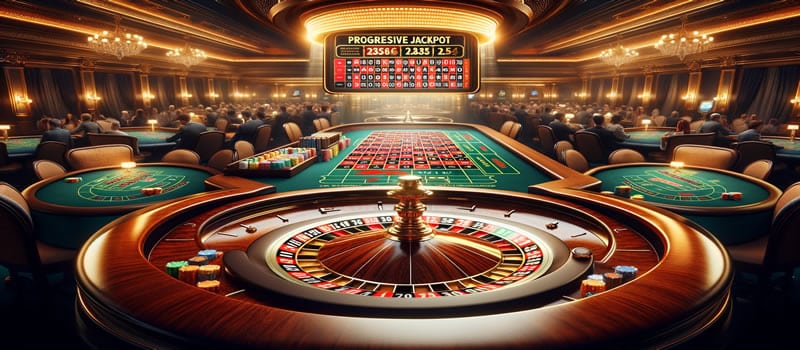The attraction of the jackpot is incredibly powerful that individuals across different backgrounds find themselves captivated by it. It presents a nearly irresistible pull is the possibility of winning a sizable quantity of money through gaming at casinos, participating in lotteries, or playing games of chance. For millions of people around the world, the idea of becoming wealthy and financially independent in an instant is an alluring one. Numerous mental triggers contribute to the jackpot's attraction.
Key Takeaways
- Why jackpots captivate us: The excitement of landing a huge win draws people in because of the potential for transformative gains.Dopamine and the jackpot effect: Our brain's reaction to potential rewards, such as winning a jackpot, is fueled by the release of dopamine, creating a sense of pleasure and drive.The role of risk and reward: Our draw to jackpots stems from the combination of risk with the possibility of reward, activating the brain's reward system.The psychology of hope and optimism: The chance of a big win impacts our mindset, fostering feelings of hope and optimism for the future.Social and cultural influences: The jackpot’s appeal to us is influenced by societal values, cultural norms, and social influences.
The ability to enjoy luxury without worrying about money and the possibility of financial liberation is highly appealing to many. The allure of potentially affording anything, such as luxurious clothing or far-flung travel, pushes individuals to strive for big successes. In addition, a major part of the jackpot's appeal stems from its element of surprise & unpredictability. The rush can’t easily be replicated the adrenaline rush that is felt when imagining a big win with a single ticket purchase or by a large slot machine payout. The draw to jackpots also taps into our innate desire for adventure and excitement.
The possibility of striking it rich offers an exciting new life beyond the monotony of daily life. Many people are motivated to chase after huge jackpots because they find great resonance in the idea of taking a chance & possibly coming out on top. The thrill of placing a huge bet or the suspense of waiting for the lottery results are just two examples of how people are drawn to jackpots because they tap into the natural human desire for thrills and adventures. The Function of Dopamine in Expecting Rewards. Dopamine is critical in attracting us to potential rewards, which is why jackpots are irresistible.
A neurotransmitter called dopamine is released in response to pleasurable experiences like indulging in delectable food, taking part in enjoyable activities, and yes, winning big. Dopamine is essential in the brain's reward circuits. Our brains release dopamine when we expect a possible reward, such as a lottery win, which feels great and makes us want to go after the reward even more. The Dopamine-Propelled Chase of Massive Victories. There’s a powerful drive to seek out big wins by the strong psychological pull that is fueled by dopamine production in response to possible rewards.
The possibility of winning the lottery floods the brain with dopamine, which produces an irresistible rush and joy. It is this dopamine-driven reaction to possible rewards that drives our desire to take risks in the hopes of striking it rich & pulls us towards jackpots. Addiction and compulsive behavior: dopamine’s downside. The brain releases dopamine in a cascade when we anticipate a big win, which can create an extremely addictive feeling of excitement and anticipation. Gambling addiction often stems from this, which can be explained by dopamine's role in our draw to jackpots. A strong psychological pull that can result in addiction & an inability to resist the allure of big wins is driven by the dopamine released for potential rewards.
Our natural desire for risk and reward is closely tied to the allure of the lottery. The possibility of striking it rich is a high-stakes game that appeals to our innate yearning for thrills and experiences. Our interest in jackpots is driven by the rush that comes with going after big victories. Many people are motivated by the concept of risk-taking and possibly hitting it big, which motivates them to take chances in the hopes of winning the ultimate lottery prize. Humankind’s history as hunter-gatherers may also be used to explain the connection between risk-taking and reward-seeking in attracting us to jackpots.

Risk and reward drive our pull to jackpots, which connects with our need for independence and autonomy. The potential for wealth presents an opportunity for limitless living and on one's own terms. The opportunity to take a risk and possibly making huge gains taps into our innate need for independence and personal agency, which motivates us to go for big wins in the quest for financial freedom. Our attraction to jackpots is largely driven by the psychology of optimism & hope. The possibility of striking it rich sparks hope for a better future, which bolsters our confidence and inspires us to aim for large wins.
It is hard to ignore the sense of hope that comes from the idea that one lucky moment has the potential to transform our lives. The possibility of vast wealth taps into our innate yearning for optimism & hope, encouraging us to take chances in the quest for financial security and financial stability. The optimism and hope psychology also deeply influences our mindset about going after big victories.
Our optimism is fueled and we are motivated to pursue big wins despite the odds because we believe in the possibility of winning big. This feeling of anticipation can be highly addictive. We take risks in search of financial security because we have an unyielding optimism that one lucky win could change our future. The influence of optimism & hope on our thinking regarding jackpots also relates to our deep desire for control of our own lives. Our optimism is fueled by the possibility of striking it rich, which inspires us to take risks in the search for financial freedom and freedom from financial constraints. We can't ignore the influence of social & cultural factors on our attraction to jackpots.
We are continuously exposed to messages that reaffirm the appeal of getting rich, with media portrayals of overnight millionaires to societal norms to achieve financial wealth. Our view of jackpots are shaped by the ubiquitous influence of social and cultural factors, which fuel our jackpot addiction and encourage us to gamble in the quest for financial security. Social pressure and social norms are just two more examples of how social and cultural factors affect our attraction to jackpots. Seeking large victories is regarded as an desirable, glitzy, and exciting pursuit in many social circles.
People may chase large wins in an effort to win approval or impress others by experiencing the pressure to match the success of peers or those who have won big. Our innate need for status is further evidenced by the societal influences on our attraction to jackpots. What draws us to jackpots and pushes us to gamble in the hopes of hitting the jackpot is the possibility of becoming wealthy and well-recognized, which can boost our status. The Addictive Nature of Jackpot Pursuits. The dopamine-driven reaction to prospective rewards can create a dangerous cycle that causes individuals to keep gambling in the hopes of winning big, frequently at great personal expense.
Chasing losses can result in a detrimental cycle that can devastate someone's finances and overall happiness. Jackpots' Dark Side: Mental Health and Relationships. Pursuing big wins can take a toll on relationships and emotional well-being in addition to financial ruin. People who develop an addiction to gambling frequently struggle with mounting debt & money problems, which can leave them feeling anxious, depressed, and feelings of despair.
In addition, gambling for jackpots can strain bonds with friends & family, leaving one feeling alone & loneliness. Support and Awareness for Addicts. The dangers of chasing jackpots make it clear that individuals struggling with addiction need more understanding and support.
Society must understands the possible risks associated with chasing jackpots and provide help to individuals who may be at risk of developing addictive behaviors. By doing this, we can work towards a setting that is safer and more supportive for those struggling to resist the lure of the big win. Create healthy gambling habits to help people manage the psychological effects of jackpot pursuits.
Limiting the time spent and amount of money invested on gambling activities can prevent compulsive habits and lessen the risks involved in gambling for big wins. For individuals struggling with gambling addictions linked to chasing jackpots, getting help from friends, family, or professional counselors can be hugely beneficial. People can prevent themselves from falling into addiction by adopting healthier coping strategies for managing stress and emotional triggers.

People can Click for more discover healthy ways to manage their stress without turning to high-risk gambling activities by staying active, meditating, or finding enjoyable hobbies and pastimes. To sum up, people from all walks of life are fascinated by the jackpot because of its irresistible attraction. The appeal of large wins is fueled by numerous mental triggers, ranging from the dopamine response in reaction to potential gains to our natural craving for risk. However, in order to prevent developing compulsive gambling behavior patterns, people should be aware of the possible risks involved in jackpot pursuits and adopt healthy habits for managing the emotional effects.
People can experience the excitement of chasing large wins without giving in to the negative effects of compulsive gambling behavior by comprehending the psychology underlying our attraction to jackpots & adopting positive, healthy gambling habits.
Frequently Asked Questions
What is the psychology behind the attraction to winning big jackpots?
Our interest in large jackpots is rooted in the human brain's reward system. When we think about winning big, our brains produce dopamine, a neurotransmitter linked to joy and reward-seeking. This dopamine release creates a feeling of excitement and creates hope, making it addictive.
What keeps people playing after they lose?
People continue to play for jackpots even after experiencing losses due to the phenomenon known as "near-miss" experiences. When players almost win, it triggers a surge of dopamine similar to that of a real win. This close-call event can create a sense of hope and drives them to keep playing, even when they’ve lost before.
How does social pressure fuel jackpot attraction?
Social factors are key in the attraction to winning big jackpots. The visibility of jackpot winners in the public eye and among friends can create a sense of social proof, leading individuals to think winning is possible and worth pursuing. Additionally, the excitement and celebration surrounding jackpot wins can motivate others to start gambling.
Are there any potential negative effects of the attraction to winning big jackpots?
The attraction to winning big jackpots can lead to potential negative effects, particularly when gambling becomes addictive. Constant gambling in pursuit of big wins can result in financial strain, relationship problems, and mental health issues. Moreover, the allure of winning big jackpots can create false hope and a distorted perception of probability.
What are healthy ways to handle jackpot attraction?
You can keep jackpot cravings under control in a healthy way by setting limits on their gambling behavior, practicing responsible gaming, and asking for help if they feel their attraction to jackpots is becoming problematic. It's important to keep gambling in perspective and enjoy it for fun over obsessing about winning big.